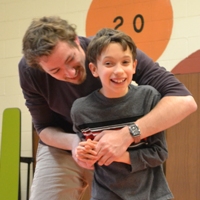Nisonger Center (OH UCEDD/LEND) Leads Team for Shakespeare and Autism Study
July 16, 2013
![]() http://nisonger.osu.edu/shakespeare-autism-VNR-03-2013
http://nisonger.osu.edu/shakespeare-autism-VNR-03-2013

|
Faculty and trainees at The Ohio State University Nisonger Center UCEDD are collaborating with Kelly Hunter of the Royal Shakespeare Company, the Ohio State Department of Theatre, and the Columbus Public Schools to assess the effectiveness of a drama-based autism intervention. The randomized, controlled study will be completed in Spring 2015. The purpose of the study is to assess the long-term effects of the drama intervention on adaptive, social, and communicative skills for youth with autism.
Over the past 20 years Hunter has developed "The Hunter Heartbeat Method" based on the iambic pentameter used in most Shakespearean drama and has seen positive change in students with autism spectrum disorders who engage in the exercises. Following promising results from a ten-week pilot study, Nisonger researchers designed a randomized controlled trial to measure the potential effects of the Hunter Heartbeat Method. To our knowledge this is the only intervention using Shakespeare to address the core symptoms of autism.
Margaret Meiling, an Intellectual and Developmental Disability (IDD) psychology student at the Nisonger Center, shadowed Ms. Hunter working with children in New York for six weeks and developed an intervention manual which is used by OSU theatre faculty and students to assure fidelity of treatment during the intervention. Several additional IDD psychology students at the Nisonger Center are assisting with data collection during the project.
The project created an interdisciplinary research collaboration between the arts and sciences at Ohio State and the Columbus City School district. The OSU theatre department was interested in sustaining the experiences the project provides their students and is developing an elective based on the Hunter Heartbeat Method. The course will focus on multidisciplinary collaboration and will include an outreach project with a community partner. Most theatre students know little about autism and are surprised to see the use of Shakespeare as a therapeutic activity. One of the OSU student teachers, Mahmoud Osman, remarked on how he and his fellow students enjoyed observing study participants becoming more comfortable with emotional expression conversational skills within a short time. "If these activities were used with college students, most of them would not engage to the degree these children have," said Osman.
Parents and teachers have also reported changes in social skills in the children. Many of the participants would like to continue with drama-based activities after the intervention ends. One student joined the drama club at his school.
The study will continue during the school calendar year through Spring of 2015. For further information please contact Eileen Scahill, Wexner Medical Center Public Affairs and Media Relations, 614-293-3737 or [email protected].
The project was funded by an Ohio State University Engagement Impact grant.







